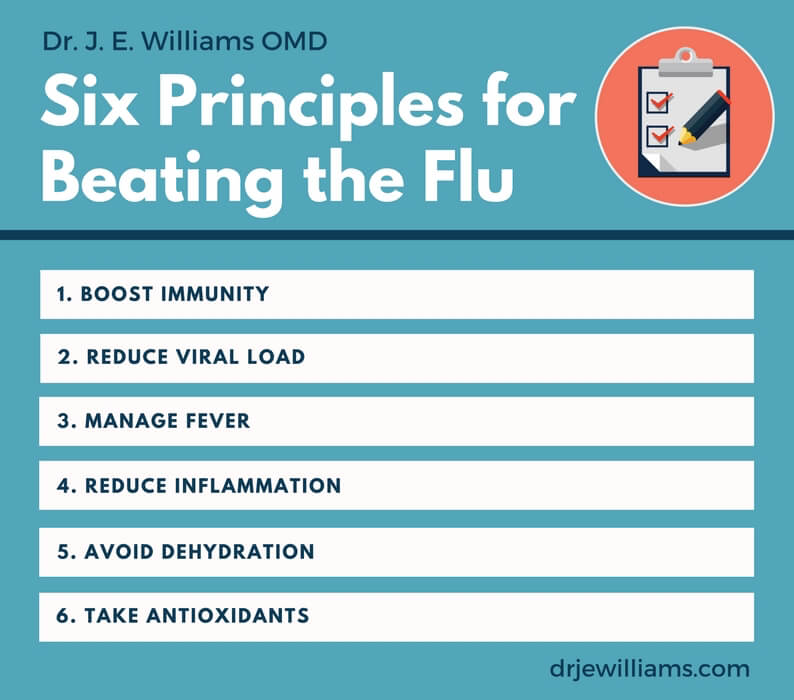The 6 Principles for Beating Seasonal Flu in 2018 (Part I of III)
Seasonal flu is inevitable. All viruses have one goal, to infect living cells to replicate.
| | Reading Time: 5 minutes

Closer Than You Think – Or Not: Exploring the Impact of Bird Flu on Personal and Global Health in 2025There’s no cure for pandemic influenza or seasonal flu. But that doesn’t mean you have to be a victim of the flu. From my more than thirty years of clinical experience and an exhaustive review of the scientific literature, I believe you can get better faster with fewer symptoms using natural medicines.
A couple of elements for beating the flu stand out more than others. If you get sick, the two essential elements are managing symptoms and shortening the course of the flu. You beat the flu by using strategies that lessen the severity of symptoms and taking natural medicines to speed up recovery time.
Fundamentals of Flu Fighting
It’s also important to understand the six fundamental principles for outsmarting and beating all types of influenza infection. My book Beating the Flu, The Natural Prescription for Surviving Pandemic Influenza and Bird Flu goes into these in detail.
1. Boost Viral Immunit
Enhancing your protection against seasonal flu begins in the early fall, well ahead of flu season. Don’t worry. If you haven’t taken measures to boost your immune system, you can start at any time.
One key to viral immunity is getting enough of the trace minerals zinc and selenium. Vitamins A and C are also necessary. However, overdosing on supplements doesn’t create super immunity. In fact, research shows that too much vitamin A can suppress the immune response. Zinc in excess of 225 mg is toxic, causing nausea and vomiting. Also, excess vitamin C causes diarrhea.
Every element of your immune system has to be just right. Loading up on supplements that overstimulate your system could make things just as bad as being deficient. Finding your personal “Goldilocks” zone is the objective. And, remember that the goal is to reduce symptoms and speed recovery, not to knock out the flu bug.
2. Reduce Viral Load
A virus has one goal. To replicate. Once you’ve been exposed, influenza viruses get into your body and follow a sequence of steps for infection. After they enter living cells in your respiratory tract, influenza viruses use genetic material and information in those cells to replicate. Antiviral medications and natural antivirals inhibit viral replication and can also kill germs. By reducing the number of viruses, your immune system finds it easier to do its job.
3. Manage Fever
Spiking a fever is the natural response of the immune system to infection. However, unmanaged high fever, especially in infants and pregnant woman, can cause harm or even death. Start managing fever at 100 degrees Fahrenheit. Do not let your temperature get above 102 degrees Fahrenheit. Herbs that help manage fever include yarrow and elderberry. Cool baths and sponge baths help. Acetaminophen lowers fever and lessens pain, but overuse can have serious side-effects, as well as blunting the immune response.
4. Reduce inflammation
When out of control, the body’s inflammatory response to infection can cause tissue damage or death. Laboratory tests for inflammation include sedimentation rate (ESR) and C-reactive protein (CRP). Your white blood cell (WBC) count might be higher or remain normal during infection. Often lymphocytes are lower than normal; while monocytes are higher.
Quercetin, Omega-3 fish oil, or green-lipped mussel extract can help modify inflammation. Non-steroidal anti-inflammatory drugs like ibuprofen can help. For severe or life-threatening inflammation, you may need steroids. However, according to the 2004 study with MS patients, there is not much difference between the effectiveness of ibuprofen, acetaminophen, and prednisone for managing flu symptoms. In my clinical opinion, the best choice is to start with natural medicines and use acetaminophen as needed.
5. Avoid dehydration
Fever and inflammation induce fluid loss. Dehydration makes you feel very tired. Other signs of dehydration include: thirst, dry mouth and lips, scanty dark-colored urine, lightheadedness, and headache. Severe dehydration leads to muscle weakness, rapid heart rate, and fainting. Drink plenty of water. Try diluted juices, and don’t forget chicken soup. Use electrolyte drinks like Pedialyte to prevent dehydration in children. Intravenous fluids may be necessary for severe dehydration.
6. Take antioxidants
Viruses cause cell and tissue damage that lead to advanced oxidative changes. Take antioxidants to help your body keep up with the rate of tissue repair during and after the flu. Eat plenty of fruits and vegetables. Drink fresh vegetable juices and herbal teas that are high in polyphenolic compounds. Take antioxidant supplements like vitamin C and zinc.
Which Flu Strain Is Most Likely to Hit in 2018?

Seasonal influenza viruses travel in packs. H1N1 and H3N2 influenza strains are this year’s most likely duo. A variant of H3N2 has attracted the most concern.
Influenza A (H3N2), called the “Aussie flu,” is a variant strain of the swine flu. More than two and a half times the average number of confirmed influenza cases were reported in Australia. The Aussie flu peaked in mid-August 2017. In the Southern Hemisphere, fall and winter occur between May and August – the opposite of the Northern Hemisphere. However, it persisted for several weeks longer than average. Australian public health experts estimated the 2017 seasonal flu vaccine effectiveness was low.
By October 2017, Britain braced for an epic flu season. Even though the available flu vaccine didn’t work well in Australia or Hong Kong, Brits lined up to get shots. England is usually the country next in line for flu outbreaks because of direct air travel between London and Australia. But, Canada also has direct air travel to Hong Kong, as well as London, making it equally vulnerable.
By mid-November 2017, flu activity remained low across Europe. Though England had a sharp increase in flu cases, it was not as high as feared.
Should You Get the Flu Vaccine?
Vaccination may help reduce the severity of the flu but does not prevent infection. Depending on the circulating strain, seasonal flu vaccine effectiveness varies from year to year between 10 and 60 percent. For the current influenza A (H3) strain, vaccination provides less than 40 percent protection. In people over 65-years, vaccination provides about 25 percent effectiveness.
It turns out that the type of influenza A (H3N2) is a match for the WHO vaccine recommended composition for the Northern Hemisphere in 2017-2018. But influenza viruses travel in groups and change fast. A good vaccine match for one week may prove unmatched a few weeks later. So far, no mutations have been detected in the U.S. But, if a variation develops, vaccines will be even less effective.
Vaccination can help, but it takes at least two works for antibodies to develop and provide protection.
Prevention & Avoidance
Prevention comes first. The best prevention is avoidance. If you don’t get exposed, you won’t get sick.
Flu spreads quickly between humans. Washing your hands and wearing a mask helps prevent infection. Wiping surfaces with Clorox helps. Clorox disinfecting wipes work within minutes and kill 99.9% of influenza viruses.
Beating the flu requires a toolkit. It should include supplements and natural medicines, and home healthcare products.
Beating the Flu Toolkit:
- Boxes of tissue
- Plastic bags to dispose of used tissue
- Bottled water
- Clorox disinfecting wipes and spray
- Digital thermometer
- Vicks VapoRub and cough drops
- Chicken soup
- Raw honey
- Sea salt
- Saline drops or Neti pot
- Acetaminophen or ibuprofen to manage fever
And, stay home if you’re sick with the flu. Not infecting others is as important as preventing infection for yourself and your family. Charge your iPad or Kindle, or have a good book to read. Get comfy, rest, and drink plenty of fluids.
In Part II, I’ll outline the best supplements to beat the flu. And, in Part III, I’ll review the top herbal remedies.



